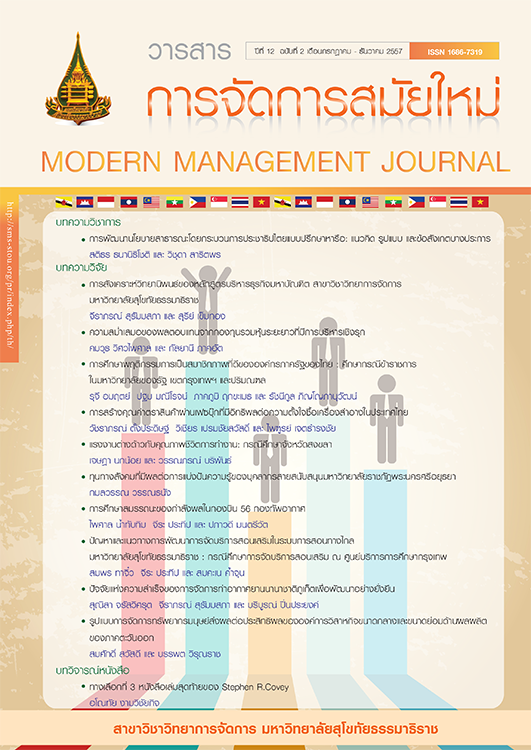ความสม่ำเสมอของผลตอบแทนจากกองทุนรวมหุ้นระยะยาวที่มีการบริหารเชิงรุก
Keywords:
กองทุนรวมหุ้นระยะยาว, กองทุนรวมที่บริหารเชิงรุก, การลงทุน, ตลาดหลักทรัพย์, Long Term Equity Fund, Actively Managed Fund, Investment, Stock MarketAbstract
บทคัดย่อ
กองทุนรวมหุ้นระยะยาว (กองทุนรวม LTF) เป็นกองทุนรวมตราสารทุนประเภทหนึ่งที่เน้นการลงทุนในบริษัท
จดทะเบียนในตลาดหลักทรัพย์แห่งประเทศไทย การลงทุนในกองทุน LTF ได้รับสิทธิพิเศษในการลดหย่อนภาษีสำหรับ
ผู้ลงทุนในปีภาษีที่ซื้อหน่วยลงทุน สำหรับการลงทุนในกองทุนโดยทั่วไปแล้วผู้ลงทุนจะพิจารณาผลการดำเนินงานในปีที่ผ่านมาของกองทุน โดยมีตัวแปรที่สำคัญที่ต้องพิจารณาหลายตัวแปร รวมถึงอันดับของกองทุนตามอัตราผลตอบแทนและความสามารถในการสร้างผลตอบแทนเหนือดัชนีตลาด งานวิจัยนี้มีวัตถุประสงค์เพื่อศึกษาความสม่ำเสมอของอันดับและความสามารถในการเอาชนะตลาดว่ามีความต่อเนื่องหรือไม่
ความสม่ำเสมอของอันดับของกองทุนสามารถวัดได้โดยการใช้ค่าสถิติสหสัมพันธ์แบบลำดับที่ของสเปียร์แมน ภายหลังการจัดอันดับของกองทุนเรียงตามอัตราผลตอบแทนในแต่ละปี ความสม่ำเสมอในการเอาชนะตลาดของกองทุนสามารถตรวจสอบได้โดยใช้สถิติแบบพรรณนาจากจำนวนเหตุการณ์ที่เกิดขึ้นและการคำนวณความน่าจะเป็น
ผลการวิจัยพบว่าข้อมูลอันดับกองทุนในปีที่ผ่านมาไม่สามารถบ่งชี้ได้อย่างชัดเจนว่ากองทุนที่ได้รับการจัดอันดับผลตอบแทนที่สูงจะสามารถอันดับผลตอบแทนดังกล่าวได้อย่างต่อเนื่องในปีถัดไป ในประเด็นความสามารถในการเอาชนะตลาดอย่างต่อเนื่องนั้นพบว่ากองทุนที่สามารถเอาชนะตลาดได้ในปีแรกจะสามารถเอาชนะตลาดได้ต่อเนื่องอีกไม่เกิน 2 ปี
Abstract
Long Term Equity Funds (LTFs) are a family of equity funds which invest heavily in listed companies in the Stock Exchange of Thailand. Investments in LTFs are entitled to income-tax deduction for investors in a particular tax year. It is understandable that individual investors consider past performance when buying a fund. Past performance usually includes two important variables, the ranking of a particular fund and the ability to beat the stock market index on a consistent basis. The main objective of this paper was to examine the performance consistency of the actively-managed LTFs based on these variables.
The consistency of the fund’s rank was determined by the non-parametric Spearman’s Rank Correlation Coefficient where the sampled funds were ranked by their rate of annual returns. The consistency of the fund’s ability to beat the market was determined by simple descriptive statistics in terms of the number of events and probability.
Results from this study were not supportive for fund selection based on its rank from the previous year because it is less likely for a highly-ranked fund to maintain its high rank in the following year. The ability to beat the market shows little promise where the funds that beat the market at the first time in any year will likely to continually outperform the market index for less than two years.



